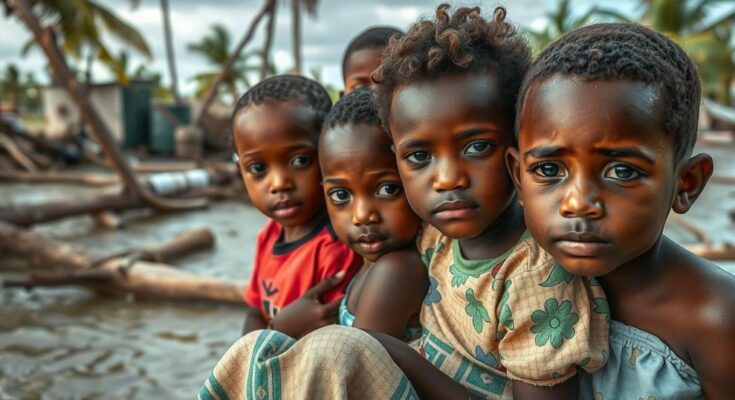Tropical Cyclone Chido has had a devastating impact on northern Mozambique, affecting approximately 90,000 children and displacing thousands of families. The storm has destroyed over 35,000 homes and significant infrastructure, primarily in Cabo Delgado. Initial reports indicate that at least 190,000 people urgently require humanitarian aid. UNICEF and other agencies are mobilizing resources to respond to the disaster amidst ongoing challenges.
Tropical Cyclone Chido has recently wreaked havoc in northern Mozambique, severely impacting around 90,000 children and displacing thousands of families. The cyclone has destroyed or damaged more than 35,000 homes, with initial assessments indicating that it has affected at least 174,000 individuals overall. Critical infrastructure, including classrooms and health facilities, faced significant destruction, particularly in the Cabo Delgado province, where the cyclone made landfall near Pemba.
UNICEF has highlighted the dire situation for children in Mozambique, noting that even prior to Cyclone Chido, many were already facing numerous life-threatening emergencies due to ongoing conflicts, drought, and disease outbreaks. The storm has further compounded existing vulnerabilities, particularly as Cabo Delgado has endured seven years of turmoil, resulting in over 1.3 million internally displaced persons, predominantly women and children. In addition, the cyclone has devastated regions in Nampula and Niassa provinces, leaving thousands without basic utilities such as electricity and clean water.
In response to the disaster, various UN agencies, along with local partners and NGOs, are mobilizing to provide emergency humanitarian assistance. Initial provisions include essential supplies such as blankets, sleeping mats, and emergency shelter materials to those affected. The UN has indicated that approximately 190,000 individuals urgently require aid, as early assessments suggest that the cyclone has severely impacted many rural communities, complicating an already serious choleral outbreak.
UN Secretary-General António Guterres has stated that UN teams are actively delivering emergency support in the region and are prepared to escalate assistance as necessary. However, the response efforts are hindered by limited supplies. The Emergency Relief Coordinator has allocated $4 million toward early humanitarian efforts, and the World Food Programme aims to scale up support for the growing number of individuals facing food insecurity as the impacts of the cyclone unfold.
The article discusses the aftermath of Tropical Cyclone Chido, which has significantly impacted northern Mozambique, particularly in the Cabo Delgado province. The cyclone, which brought heavy rains and strong winds, has caused extensive damage to infrastructure, homes, and essential services, affecting the lives of children and families who were already facing multiple crises, including conflict and health emergencies. This creates a challenging context for humanitarian response efforts, given the region’s ongoing struggles with food insecurity and disease outbreaks.
In conclusion, Cyclone Chido has inflicted serious damage on northern Mozambique, affecting tens of thousands of children and further complicating an already critical humanitarian situation. The destruction of homes, schools, and health facilities highlights the pressing need for immediate assistance to support vulnerable populations. Continuous relief efforts by various organizations are crucial in mitigating the cyclone’s impact and addressing the needs of those significantly affected by such natural disasters.
Original Source: news.un.org




